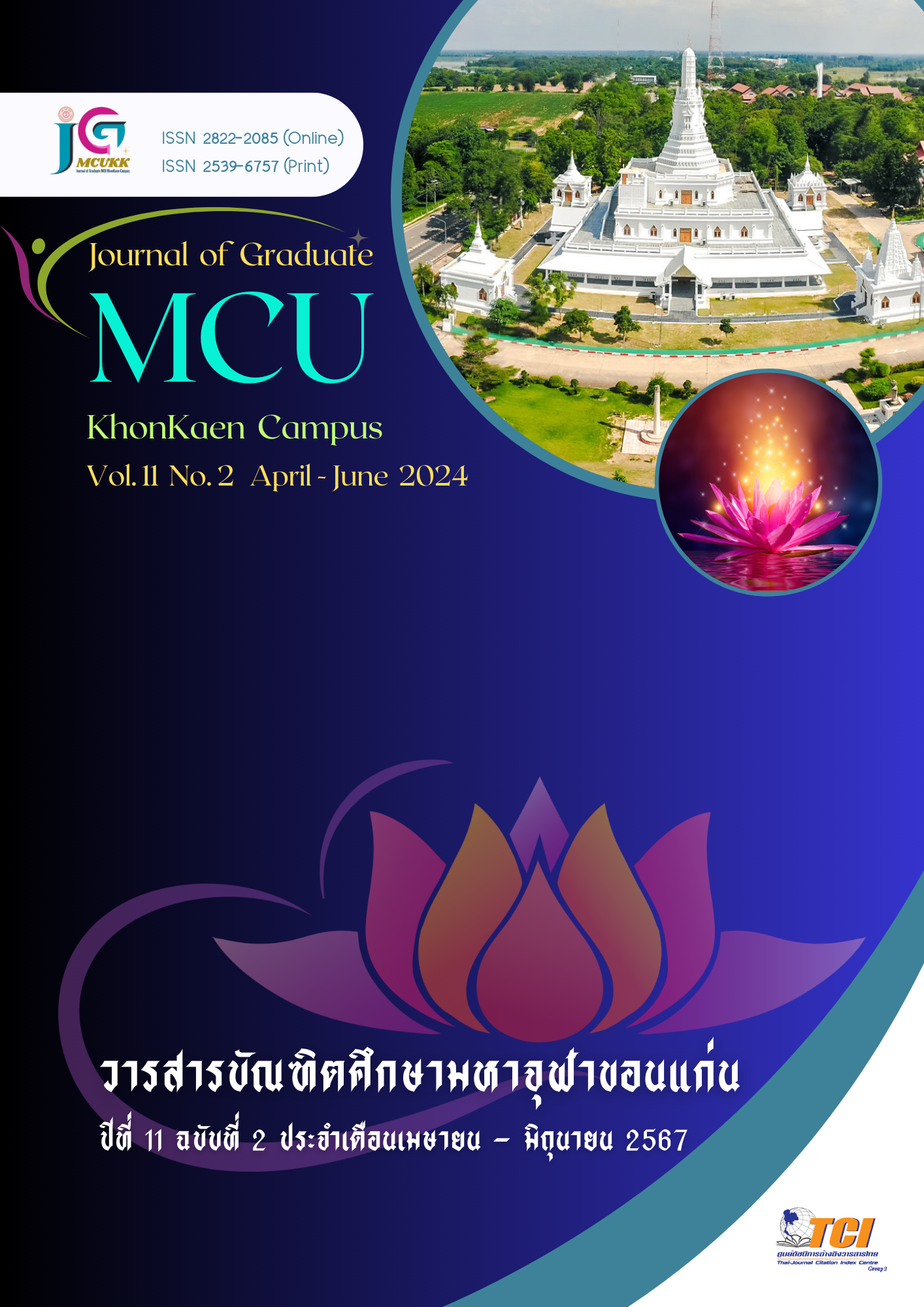การบริหารงานบุคคลตามหลักสัปปุริสธรรม 7 ของผู้บริหารสถานศึกษา ในสังกัดสำนักงานเขตพื้นที่การศึกษาประถมศึกษาบึงกาฬ
Main Article Content
บทคัดย่อ
การวิจัยครั้งนี้มีวัตถุประสงค์เพื่อ 1) ศึกษาสภาพการบริหารงานบุคคลตามหลักสัปปุริสธรรม 7 ของผู้บริหารสถานศึกษาในสังกัดสำนักงานเขตพื้นที่การศึกษาประถมศึกษาบึงกาฬ 2) เสนอแนวทางการส่งเสริมการบริหารงานบุคคลตามหลักสัปปุริสธรรม 7 ของผู้บริหารสถานศึกษาในสังกัดสำนักงานเขตพื้นที่การศึกษาประถมศึกษาบึงกาฬ ใช้รูปแบบการวิจัยแบบผสมผสานวิธี กลุ่มตัวอย่างคือ ผู้บริหารสถานศึกษาและครู จำนวน 329 คน ผู้ให้ข้อมูลสำคัญจำนวน 10 คน เครื่องมือที่ใช้ในการวิจัย ได้แก่ แบบสอบถามและแบบสัมภาษณ์กึ่งโครงสร้าง วิเคราะห์ข้อมูลโดยการหาค่าความถี่ ค่าร้อยละ ค่าเฉลี่ย ค่าส่วนเบี่ยงเบนมาตรฐาน และการวิเคราะห์เนื้อหา
ผลการวิจัยพบว่า
1. สภาพการบริหารงานบุคคลตามหลักสัปปุริสธรรม 7 ของผู้บริหารสถานศึกษาในสังกัดสำนักงานเขตพื้นที่การศึกษาประถมศึกษาบึงกาฬ ภาพรวมทั้ง 7 ด้าน มีความคิดเห็นอยู่ในระดับมาก
2. แนวทางการแนวทางการบริหารงานบุคคลตามหลักสัปปุริสธรรม 7 ของผู้บริหารสถานศึกษาในสังกัดสำนักงานเขตพื้นที่การศึกษาประถมศึกษาบึงกาฬที่สำคัญ คือ 1) ด้านธัมมัญญุตา (รู้จักเหตุ)
ผู้บริหารต้องมีการจัดทำคู่มือการบริหารงานบุคคล และกำหนดมาตรฐานการปฏิบัติงานในตำแหน่งต่าง ๆ ของครูและบุคลากรไว้อย่างชัดเจน 2) ด้านอัตถัญญุตา (รู้จักผล) ผู้บริหารควรกำหนดเป้าหมายและส่งเสริมให้บรรลุตามที่กำหนดไว้ 3) ด้านอัตตัญญุตา (รู้จักตน) เปิดโอกาสให้ครูและบุคลากรได้ เสนอความต้องการในการพัฒนาตนเองตามความรู้ ความสามารถและความถนัด 4) ด้านมัตตัญญุตา (รู้จักประมาณ) ควรมีการจัดสรรงบประมาณสนับสนุนเป็นค่าใช้จ่ายในการพัฒนาบุคลากร 5) ด้านกาลัญญุตา (รู้จักกาล) มีการจัดลำดับความสำคัญของงานได้เหมาะสมควร แก้ไขปัญหาที่เกิดขึ้นได้ทันต่อเหตุการณ์และเวลา 6) ด้านปุริสัญญุตา (รู้จักชุมชน) มีสัมพันธ์ที่ดีต่อชุมชนทำให้การบริหารงานโรงเรียนเป็นไปได้ด้วยดีและราบรื่น 7) ด้านปุคคลัญญุตา (รู้จักบุคคล) ผู้บริหารควรมอบหมายงานให้ครูและบุคลากรปฏิบัติตามลักษณะและปริมาณงานอย่างเหมาะสมตามความรู้ ความสามารถ
Article Details

อนุญาตภายใต้เงื่อนไข Creative Commons Attribution-NonCommercial-NoDerivatives 4.0 International License.
เอกสารอ้างอิง
ทองย้อย แสงสินชัย. (2543). ความจริงในมหาปรินิพพานสูตร (กรณีพระมโน). (พิมพ์ครั้งที่ 3). กรุงเทพฯ: เปรียญธรรมสมาคมแห่งประเทศไทย.
พระจิณณ์วเรณย์ อคฺคธมฺโม. (2564). การบริหารงานบุคคลตามหลักสัปปุริสธรรม 7 ในโรงเรียนพระปริยัติธรรม แผนกสามัญศึกษา จังหวัดขอนแก่น. (วิทยานิพนธ์ครุศาสตรมหาบัณฑิต). ขอนแก่น: มหาวิทยาลัยมหาจุฬาลงกรณราชวิทยาลัย.
พระธรรมกิตติวงศ์ (ทองดี สุรเตโช). (2548). ภาษาธรรม. กรุงเทพฯ: เลี่ยงเชียง.
พระธรรมโกศาจารย์ (ประยูร ธมฺมจิตฺโต). (2549). พุทธวิธีบริหาร. กรุงเทพฯ: มหาจุฬาลงกรณราชวิทยาลัย.
พระธรรมปิฎก (ป.อ. ปยุตฺโต). (2545). ภาวะผู้นำ. กรุงเทพฯ: ธรรมสภา.
พระมหาเกียรติศักดิ์ ฉนฺทธมฺโม (ยันตรุดร). (2552). การศึกษาปัญหาและแนวทางแก้ไขปัญหาการบริหาร งานบุคคลของผู้บริหารโรงเรียนพระปริยัติธรรม แผนกสามัญศึกษาในภาคตะวันออกเฉียงเหนือ. (วิทยานิพนธ์ครุศาสตรมหาบัณฑิต). นครราชสีมา: มหาวิทยาลัยราชภัฏนครราชสีมา.
ฤกษ์ชัย ใจคำปัน. (2549). การบริหารงานบุคลากรในสถานศึกษา อำเภอจอมทอง เขตพื้นที่การศึกษาเชียงใหม่ เขต 5. (วิทยานิพนธ์ศึกษาศาสตรมหาบัณฑิต). เชียงใหม่: มหาวิทยาลัยเชียงใหม่.
วรภาส ประสมสุข และ นิพนธ์ กินาวงศ์. (2550) .หลักการบริหารการศึกษาตามแนวพุทธธรรม. (วิทยานิพนธ์ดุษฎีบัณฑิต). พิษณุโลก: มหาวิทยาลัยนเรศวร.
วีระ สุรินทร์. (2553). การบริหารงานบุคลากรของโรงเรียนขนาดเล็กในอำเภอแม่แจ่ม จังหวัดเชียงใหม่. (วิทยานิพนธ์ศึกษาศาสตรมหาบัณฑิต). เชียงใหม่: มหาวิทยาลัยเชียงใหม่.
สมบัติ บุตรแสนคม. (2564). การบริหารงานบุคคลในยุคฐานวิถีชีวิตใหม่ตามหลักสัปปุริสธรรม 7 ของผู้บริหารโรงเรียนประถมศึกษา อำเภอคลองหลวง จังหวัดปทุมธานี. (วิทยานิพนธ์ครุศาสตรมหาบัณฑิต). อยุธยา: มหาวิทยาลัยมหาจุฬาลงกรณราชวิทยาลัย.

